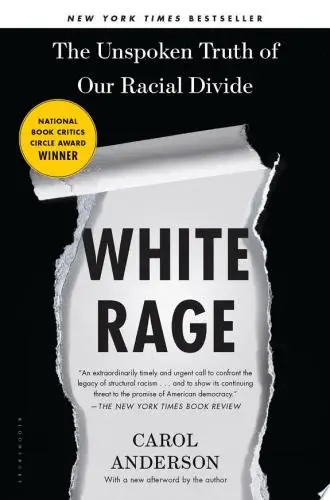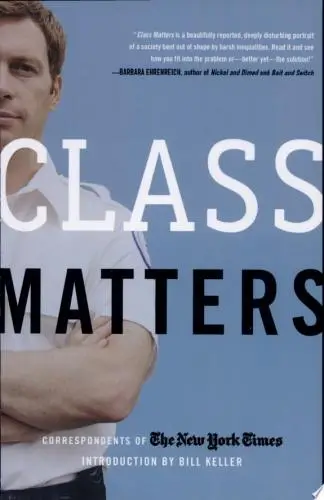Class Matters
What's it about?
Class Matters by The New York Times delves into the intricate ways class influences our lives, from education and employment to health and social engagement. You will discover real-life stories that illustrate the systemic barriers different classes face, enabling you to better understand the subtle dynamics of privilege and opportunity. The book challenges you to reflect on your own perceptions of class and encourages a deeper conversation about economic disparities in society, making it a thought-provoking read for anyone interested in social justice and equity.
About the Author
The New York Times is a major American newspaper known for its comprehensive news coverage, investigative journalism, and in-depth analysis. It offers a diverse range of topics including politics, international affairs, and culture, often with a focus on factual reporting and balanced perspectives. Its writing style is clear and authoritative.
30 Key Ideas of Class Matters
The Power of Invisible Influence
Understanding the invisible sway of social class can broaden perspectives and enhance empathy in everyday interactions.
Picture a neighborhood with stark contrasts: luxury cars parked beside well-worn sedans. While living side by side, individuals often forget how subtly their social class shapes their view of the world.
- Social class can significantly influence everything from the supermarket a person chooses to the way they interpret a movie plot.
- Recognizing class influence can improve interpersonal relationships by fostering empathy and reducing unconscious biases.
- Understanding class dynamics helps decode social behaviors often misinterpreted as personal choices.
Observe a social setting today—at work, or in your neighborhood—and consciously note any visible and invisible class influences.
Avoid assuming that all perceptions or choices are purely personal; acknowledge the broader social factors at play.
Bridging the Education Gap
Leveraging educational resources and opportunities can disrupt inherited social class trajectories.
Imagine the library as a ‘passport’: free to enter, but the experiences within are limited by how often we choose to engage.
- Education remains one of the most accessible avenues for transcending class boundaries.
- Investments in education not only offer personal benefits but also ripple effects through communities, diminishing class divides.
- Awareness and utilization of educational resources can give individuals otherwise denied opportunities a significant head start.
Enroll in an online course or workshop this week, something that adds a new skill or perspective to your toolkit.
Don’t underestimate the impact of inaction or lack of awareness; actively seek out educational resources available to you.
Network Beyond Borders
Building a diverse network across social classes enriches perspectives and enhances professional and personal growth.
Think about a diverse social gathering where varying backgrounds create a tapestry of stories and experiences that spark innovation.
- Cross-class interactions enhance creativity by introducing novel concepts and approaches.
- A broader network often leads to unexpected opportunities, crucial for professional advancement and personal enlightenment.
- Facilitating inclusive environments fosters a sense of belonging and mutual respect across class lines.
Reach out to someone outside your usual social circle this week and start a conversation to learn about their experiences.
Avoid sticking only to familiar circles; challenges and growth lie in unfamiliar interactions.
Deeper knowledge. Personal growth. Unlocked.
Unlock this book's key ideas and 15M+ more. Learn with quick, impactful summaries.
Read Full SummarySign up and read for free!
Class Matters Summary: Common Questions
We recommend Class Matters to anyone interested in understanding the nuances of social inequality and its impact on everyday life, especially those who want to engage in meaningful conversations about class and its implications in society.
Experience Personalized Book Summaries, Today!
Discover a new way to gain knowledge, and save time.
Sign up for our 7-day trial now.
No Credit Card Needed

Similar Books

The White Night of St. Petersburg
Michel (Prince of Greece)
White Rage
Carol Anderson
Band of Brothers
Stephen E. Ambrose
Defining Sexism
Elizabeth Hall Magill
The New World Order
Allen Roesch
Irvine Welsh
Robert Morace
To Kill a Mockingbird
Harper Lee
Introduction to Daisy Jones & The Six
Gilad James, PhD
The Papers of Martin Luther King, Jr., Volume I
Martin Luther King
Democracy in America
Alexis de TocquevilleTrending Summaries

Peak
Anders Ericsson
Never Split the Difference
Chris Voss
Smart Brevity
Jim VandeHei
The Psychology of Money
Morgan Housel
The First 90 Days
Michael D. Watkins
Atomic Habits
James Clear
Thinking, Fast and Slow
Daniel Kahneman
The Body Keeps the Score
Bessel van der Kolk M.D.
The Power of Regret
Daniel H. Pink
The Compound Effect
Darren HardyNew Books

Forex Trading QuickStart Guide
Troy Noonan
Comprehensive Casebook of Cognitive Therapy
Frank M. Dattilio
The White Night of St. Petersburg
Michel (Prince of Greece)
Demystifying Climate Models
Andrew Gettelman
The Hobbit
J.R.R. Tolkien
The Decision Book
Mikael Krogerus
The Decision Book: 50 Models for Strategic Thinking
Mikael Krogerus
Fichte
Johann Gottlieb Fichte
Do No Harm
Henry Marsh

